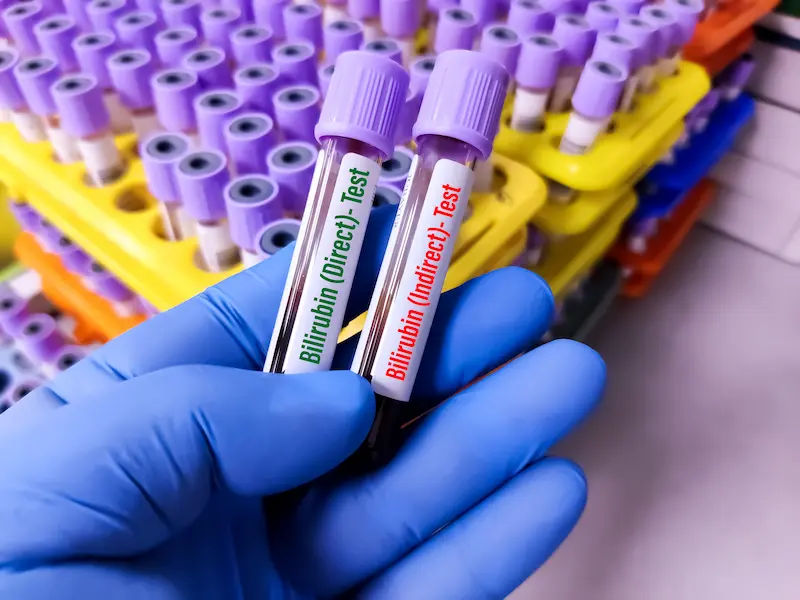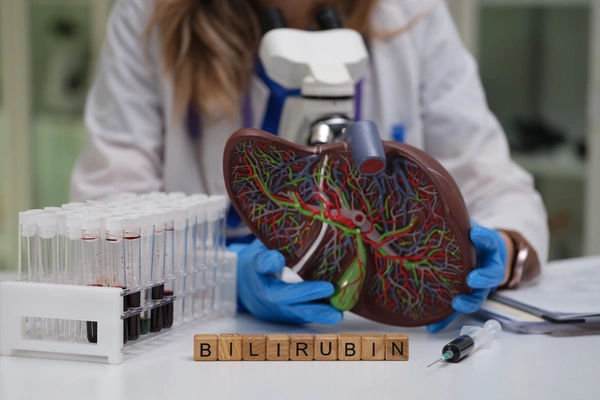Bilirunbin Test Normal Range And Benefits
Understand the normal range and benefits of the bilirubin test, a key diagnostic tool for monitoring liver health and detecting related conditions early.

Written by Dr. Mohammed Kamran
Reviewed by Dr. Dhankecha Mayank Dineshbhai MBBS
Last updated on 4th Sep, 2025

Introduction
Have you ever wondered what gives bile its distinctive colour or why a bruise turns yellow as it heals? The answer is bilirubin, a yellow-orange pigment that is a natural byproduct of the body's process of breaking down old red blood cells. While it's a normal waste product, its levels in your blood are a crucial indicator of your health. A bilirubin test is a simple blood test that measures the amount of this substance, providing a window into the health of your liver, gallbladder, and red blood cells. Understanding your bilirubin normal range is key to identifying potential issues early. This comprehensive guide will demystify the bilirubin test, explain what the results mean for your well-being, and highlight the significant benefits of keeping this important value in check.
What is Bilirubin and Why is it Measured?
Bilirubin is formed when haemoglobin, the protein in red blood cells that carries oxygen, is broken down. This process occurs primarily in the spleen. The bilirubin is then released into the bloodstream, where it binds to albumin (a plasma protein) and travels to the liver. This form is called unconjugated bilirubin or indirect bilirubin. The liver processes it, conjugating it with glucuronic acid to make it water-soluble. This conjugated bilirubin (or direct bilirubin) is then excreted into bile, stored in the gallbladder, and eventually released into the intestines to be eliminated from the body.
The test is measured for several critical reasons:
• To screen for or monitor liver diseases like hepatitis, cirrhosis, or alcohol-related liver disease.
• To diagnose conditions related to the bile ducts, such as gallstones or blockages.
• To evaluate for hemolytic anaemia, a condition where red blood cells are destroyed faster than they are made.
• To assess newborns for jaundice, which is very common but can be dangerous at high levels.
Consult a Gastroenterologist for the best advice
Understanding the Bilirubin Test Normal Range
The results of a bilirubin test are reported as milligrams per decilitre (mg/dL) or micromoles per litre (μmol/L). The "normal" range can vary slightly between different laboratories due to variations in equipment and chemicals used. However, a general guideline for adults is:
• Total Bilirubin: 0.1 to 1.2 mg/dL (or 1.7 to 20.5 μmol/L)
• Direct (Conjugated) Bilirubin: 0.0 to 0.3 mg/dL (or 0 to 5.1 μmol/L)
• Indirect (Unconjugated) Bilirubin: Calculated by subtracting direct from total bilirubin, typically falling around 0.2 to 0.8 mg/dL.
It's crucial to note that these values are for adults. Newborn bilirubin levels are expected to be much higher in the first few days of life and have their own specific monitoring charts to prevent kernicterus, a type of brain damage.
Get Your Health Assessed
Breaking Down the Types: Direct vs. Indirect Bilirubin
The distinction between direct and indirect bilirubin is the most important diagnostic aspect of the test. Think of it as a two-part story of bilirubin's journey through your body.
Direct (Conjugated) Bilirubin
This is the "processed" form. Once the liver has attached a sugar molecule to unconjugated bilirubin, it becomes water-soluble and is ready to be excreted. A high level of direct bilirubin typically indicates a problem after the liver has done its job. This often points to a blockage in the bile ducts (from a gallstone or tumor) or a problem with the liver's ability to excrete bile (as in Dubin-Johnson syndrome).
Indirect (Unconjugated) Bilirubin
This is the "unprocessed" form. It is fat-soluble and travels through the bloodstream bound to albumin. An elevated indirect bilirubin level suggests a problem before the liver processes it. Common causes include:
• Haemolysis: The accelerated breakdown of red blood cells (seen in hemolytic anaemia, sickle cell disease, or transfusion reactions).
• Gilbert's Syndrome: A common, harmless genetic condition where the liver has a reduced ability to process bilirubin, causing mild, fluctuating elevations.
• Liver enzyme deficiencies like Crigler-Najjar syndrome.
Top 5 Health Benefits of a Normal Bilirubin Level
Maintaining a bilirubin level within the normal healthy range is not just about avoiding disease; it's a sign of a well-functioning body. The benefits extend far beyond a single organ.
1. Optimal Liver Function and Detoxification
Your liver is your body's primary filtration system. A normal bilirubin level is a powerful indicator that this vital organ is efficiently processing waste, metabolizing drugs, and detoxifying your blood. It signifies that the complex enzymatic pathways within liver cells are working in harmony.
2. Healthy Red Blood Cell Turnover
Bilirubin is a direct byproduct of red blood cell recycling. A stable, normal level suggests a balanced cycle: old cells are being broken down at a normal rate, and the bone marrow is producing new, healthy cells to replace them. This prevents both anaemia and the unnecessary buildup of waste.
3. Proper Digestive Health via Bile Flow
Bilirubin is a major component of bile, which is essential for digesting fats in the small intestine. Normal bilirubin levels imply that bile is being produced, stored, and released correctly. This ensures efficient nutrient absorption and healthy bowel function.
4. Powerful Antioxidant Properties
Emerging research has revealed a fascinating benefit: bilirubin acts as a potent antioxidant. At normal levels, it helps neutralize harmful free radicals that cause oxidative stress and damage cells. This protective role may contribute to a lower risk of chronic inflammatory diseases, including cardiovascular disease and certain cancers.
5. Early Detection of Serious Conditions
Perhaps the most significant benefit is diagnostic. Because the bilirubin level is so sensitive to disruptions in the liver-blood-bile system, a simple test can provide an early warning sign for over a dozen conditions, allowing for prompt intervention and treatment long before more severe symptoms appear.
What Causes High Bilirubin Levels (Hyperbilirubinaemia)?
When bilirubin levels exceed the normal range, it leads to hyperbilirubinaemia, often visible as jaundice (yellowing of the skin and eyes). The causes are categorized by which type of bilirubin is elevated.
Causes of High Unconjugated (Indirect) Bilirubin
• Haemolytic anaemias (e.g., sickle cell, thalassemia, autoimmune haemolysis)
• Gilbert's syndrome (a benign, common condition)
• Reabsorption of large haematomas (from a significant injury)
• Ineffective erythropoiesis (the body producing defective red blood cells)
• Newborn jaundice
Causes of High Conjugated (Direct) Bilirubin
• Bile duct obstruction (e.g., gallstones, strictures, tumors)
• Hepatitis (viral, alcoholic, autoimmune)
• Liver cirrhosis
• Medication side effects
• Genetic disorders like Dubin-Johnson and Rotor syndrome
When Should You Get a Bilirubin Test?
Your doctor may order a bilirubin blood test as part of a comprehensive metabolic panel (CMP) during a routine physical. You may also need one if you experience symptoms such as:
• Yellowing of your skin or the whites of your eyes (jaundice)
• Dark-coloured urine
• Nausea, vomiting, or abdominal pain
• Unexplained fatigue or weakness
• Clay-coloured stools
How to Prepare for and Interpret Your Test?
The bilirubin test is a standard blood draw. Preparation is usually minimal. Your doctor may advise you to fast (not eat or drink anything except water) for 4-6 hours before the test to ensure the most accurate results, especially if other liver function tests are being performed simultaneously.
Interpreting your results should always be done with your doctor. They will consider your total, direct, and indirect levels in the context of your symptoms, medical history, and other test results (like ALT, AST, and ALP) to form a complete picture of your health.
Managing Your Bilirubin Levels for Better Health
While you can't directly "lower your bilirubin" through diet alone, supporting your liver's overall health is the best strategy for maintaining a normal level.
• Stay Hydrated: Water helps the liver and kidneys flush out toxins.
• Eat a Liver-Friendly Diet: Focus on high-fiber foods (fruits, vegetables, whole grains), lean proteins, and healthy fats. Foods like coffee, berries, grapes, and nuts are associated with liver health.
• Limit Alcohol: Excessive alcohol is a primary cause of liver damage.
• Use Medications Wisely: Follow dosage instructions and be aware that some medications (including over-the-counter ones like acetaminophen) can stress the liver.
• Exercise Regularly: Physical activity helps maintain a healthy weight, reducing the risk of non-alcoholic fatty liver disease (NAFLD).
Conclusion
Understanding your bilirubin test and its normal range empowers you to take an active role in your health journey. This simple yet powerful biomarker offers invaluable insights into the intricate workings of your liver, blood, and digestive system. Far from being just a measure of waste, a normal bilirubin level is a testament to your body's remarkable ability to cleanse, protect, and sustain itself. If you have concerns about your liver health or are experiencing symptoms like jaundice, don't hesitate to speak with your healthcare provider. A timely test can provide clarity, ensure early detection of potential issues, and set you on a path to optimal well-being.
Consult a Gastroenterologist for the best advice
Consult a Gastroenterologist for the best advice

Dr. Umakanth Eskala
Gastroenterology/gi Medicine Specialist
16 Years • DM (GASTRO)
Visakhapatnam
Apollo 24|7 Clinic - Andhra Pradesh, Visakhapatnam

Dr Rohit Sureka
Gastroenterology/gi Medicine Specialist
15 Years • MBBS, DNB General Medicine, DNB Gastroenterology
Jaipur
Apollo 247 virtual - Rajasthan, Jaipur
Dr. Amitava Dutta
Gastroenterology/gi Medicine Specialist
30 Years • MBBS , MD (General Medicine), DM (Gastroenterology)
Kolkata
Dr Hazra's Clinic, Kolkata

Dr. Paramesh K N
Gastroenterology/gi Medicine Specialist
16 Years • MBBS, MS ( General Surgery), DNB ( Surgical Gastroenterology)
Hyderabad
Sprint Diagnostics Centre, Hyderabad

Dr Harish K C
Gastroenterology/gi Medicine Specialist
15 Years • MBBS MD DM MRCP(UK) (SCE-Gastroenterology and Hepatology)
Bangalore
Manipal Hospital, Bangalore
Consult a Gastroenterologist for the best advice

Dr. Umakanth Eskala
Gastroenterology/gi Medicine Specialist
16 Years • DM (GASTRO)
Visakhapatnam
Apollo 24|7 Clinic - Andhra Pradesh, Visakhapatnam

Dr Rohit Sureka
Gastroenterology/gi Medicine Specialist
15 Years • MBBS, DNB General Medicine, DNB Gastroenterology
Jaipur
Apollo 247 virtual - Rajasthan, Jaipur
Dr. Amitava Dutta
Gastroenterology/gi Medicine Specialist
30 Years • MBBS , MD (General Medicine), DM (Gastroenterology)
Kolkata
Dr Hazra's Clinic, Kolkata

Dr. Paramesh K N
Gastroenterology/gi Medicine Specialist
16 Years • MBBS, MS ( General Surgery), DNB ( Surgical Gastroenterology)
Hyderabad
Sprint Diagnostics Centre, Hyderabad

Dr Harish K C
Gastroenterology/gi Medicine Specialist
15 Years • MBBS MD DM MRCP(UK) (SCE-Gastroenterology and Hepatology)
Bangalore
Manipal Hospital, Bangalore



